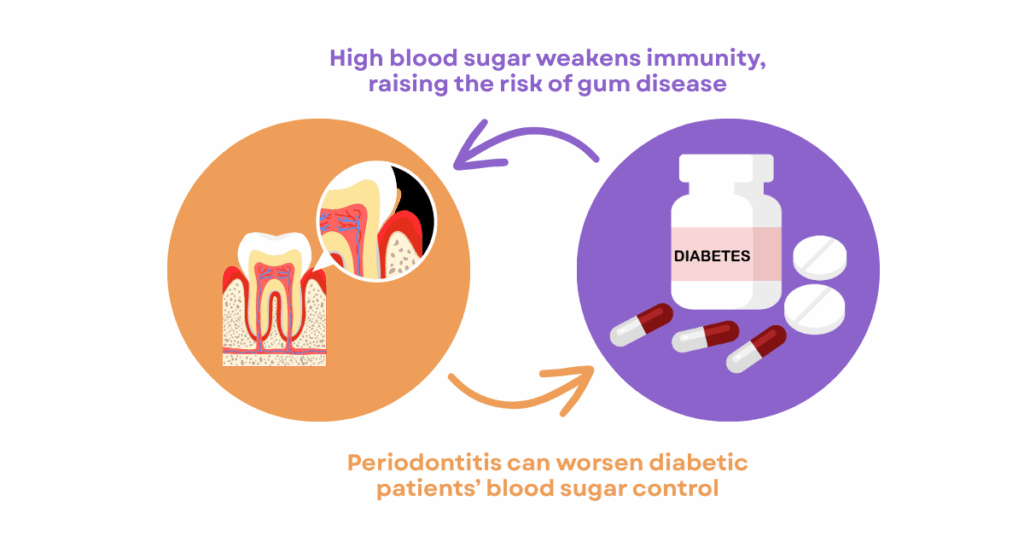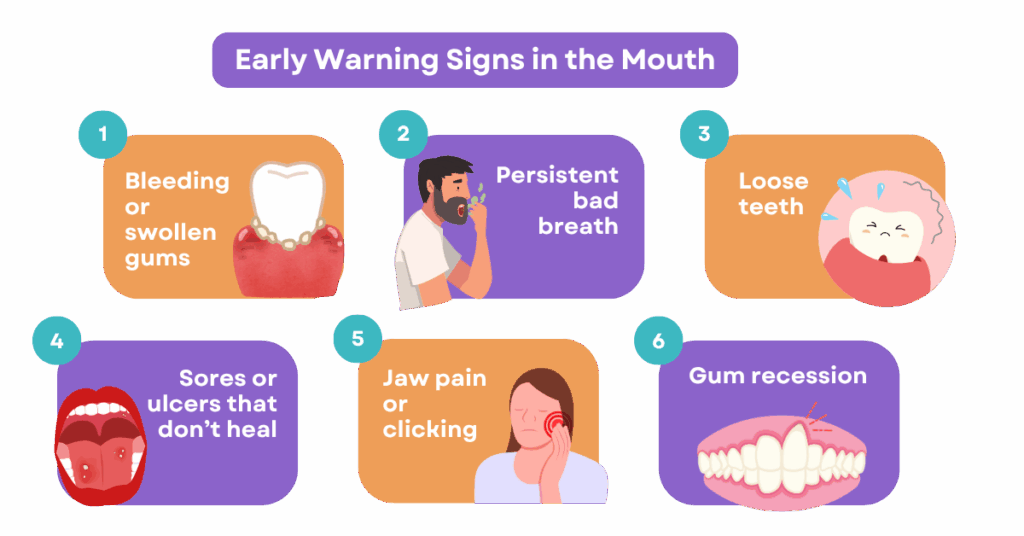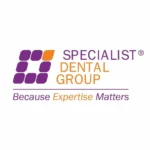Article reviewed by:
Dr Helena Lee • Periodontist
Dr Steven Soo • Prosthodontist

Most of us view oral health as just brushing and flossing — but did you know your mouth could hold the first clues to heart disease, diabetes, or even Alzheimer’s? Your dentist might be your first line of defence in detecting systemic health issues.
The state of your mouth has a direct impact on your body’s overall health and vitality. Numerous studies suggest that poor oral health can contribute to a variety of health issues. This hidden connection between the mouth and body is too meaningful to ignore.
Table of Contents
How Your Mouth Sends Signals About Your Overall Health
Your mouth is a thriving microbial habitat, boasting more bacterial diversity than most other parts of the body. Poor oral hygiene can lead to the growth of harmful bacteria, which may enter the bloodstream and trigger inflammation and infections that can affect your heart, lungs, brain, and other organs.
Additionally, systemic conditions, such as diabetes or autoimmune diseases, often manifest with early symptoms in the mouth, making your dental visits a key part of early detection and overall healthcare.
5 Serious Health Problems Linked to Oral Health
1. Cardiovascular Disease (heart disease and stroke)
Gum disease (especially periodontitis) and cardiovascular disease are among the most well-researched links. One study found that men under 50 with periodontitis have a 72% higher risk of developing heart disease compared to those with healthy gums. Bacteria from inflamed gums can enter the bloodstream, adhere to fatty deposits in the arteries, and contribute to the formation of clots, thereby increasing the risk of heart attacks and strokes.
Researchers also believe that the inflammation caused by gum disease may be a contributing factor to heart problems by increasing overall body inflammation.
2. Diabetes

There’s a two-way association between diabetes and oral health:
- High blood sugar can weaken your immune response, making you more susceptible to infections, such as gum disease.
- Severe gum disease can make it harder for people with diabetes to control their blood sugar, leading to further complications.
Studies show that treating gum disease can improve blood sugar control in diabetic patients, making it a compelling case for integrating dental and medical care.
3. Pregnancy and Birth Complications
Research has shown that hormonal changes during pregnancy, particularly increased levels of estrogen and progesterone, can significantly impact oral health, including gum inflammation and tooth decay.
There is also a strong association between periodontal disease and adverse pregnancy outcomes like preterm birth and low birth weight, highlighting the importance of preventive oral care during pregnancy. That’s why dentists often recommend a comprehensive oral check-up early in pregnancy.
Read more to find out why a dental visit is necessary during pregnancy.
4. Alzheimer’s Disease and Cognitive Decline
Emerging studies point to a possible connection between long-term gum disease and dementia. Gum disease is an infection affecting the tissues that hold your teeth in place, which can cause bleeding gums, loosened teeth, and even tooth loss. Oral bacteria and inflammatory compounds can enter the bloodstream and potentially reach brain tissue.
- The bacteria associated with periodontitis (e.g., Porphyromonas gingivalis) have been found in the brains of Alzheimer’s patients.
- Ongoing inflammation and infection may contribute to the progression of cognitive disorders over time.
While more research is needed, these findings emphasise the importance of maintaining long-term oral health to support brain health. After all, dementia can make it harder for individuals to brush and floss properly, increasing their risk of infections and gum disease.
5. Cancer
While the most direct oral-health-related cancer is oral cancer, this study reveals strong links between periodontitis and a higher risk of developing oesophageal and colorectal cancers.
In a separate study, Harvard researchers found that people with gum disease had a 43% higher risk of oesophageal cancer and a 52% higher risk of stomach cancer over 28 years, compared to those with healthy gums.
Did you know that a dental assessment by a dental specialist is essential for cancer patients before starting treatment? Curious why? We explain it all in our article.
Patients battling head and neck cancer tend to struggle more with oral care than others, often needing more teeth removed due to severe decay. For cancer patients, dental care is crucial as it helps prevent infections, enhances everyday life, and improves overall quality of life during and after treatment. That is also why our dental specialists, part of the multidisciplinary team, play a vital role.
Early Warning Signs in the Mouth

Sometimes, your oral health offers the first clues about bigger health issues. Some symptoms to watch out for:
- Bleeding or swollen gums
- Persistent bad breath
- Loose teeth
- Sores or ulcers that don’t heal
- Jaw pain or clicking
- Gum recession
These signs may signal oral problems or early symptoms of systemic conditions. For early detection, regular dental visits are essential.
Simple Habits to Boost Oral and Overall Health
Fortunately, improving your oral health is a powerful and proactive way to protect your overall health.
Here are some essential habits:
Brush & Floss Properly
- Brush twice daily with fluoride toothpaste for two minutes each time
- Floss at least once a day
Don’t Skip Dental Visits
- Visit your dentist every 6 months for a cleaning and check-up
- Alert your dentist to any health conditions, medications, or new symptoms
Eat a Tooth-Friendly Diet
- Limit sugary and acidic foods that fuel bacteria and erode enamel
- Choose a diet rich in calcium, vitamins, and whole foods
Avoid Smoking
- Smoking and chewing tobacco can significantly increase your risk of gum disease and oral cancer
Manage Chronic Conditions
- Keeping conditions like diabetes and cardiovascular issues under control can help protect your gums and teeth
Protect Your Mouth for Better Health
Your mouth is more than just a place for chewing and smiling. It’s a window into your body’s overall health. The connection between oral health and systemic health is real, and it’s becoming increasingly clear that what happens in the mouth doesn’t stay in the mouth.
By taking care of your oral hygiene and making regular dental visits, you’re investing in your long-term health and well-being.
So next time you pick up your toothbrush, remember, it’s not just about clean teeth, it’s about a healthier you.
It’s never too late to prioritise your oral health. Schedule a dental check-up today — your whole body will thank you.
Drop us a text via the WhatsApp icon on the bottom right corner, enquire or call us at (65) 6733 7883.







